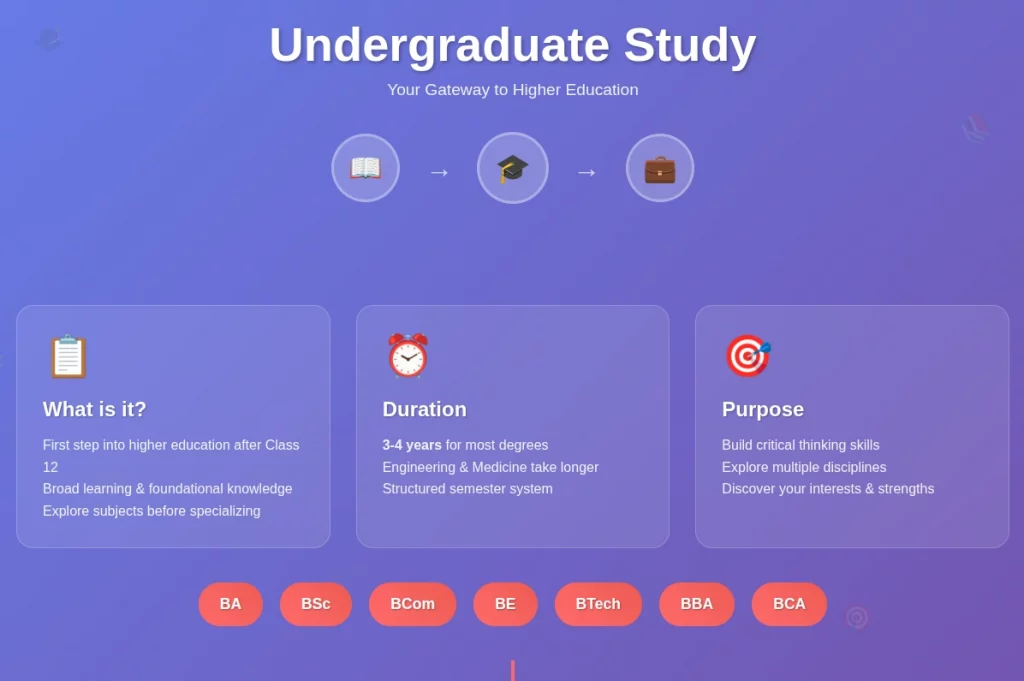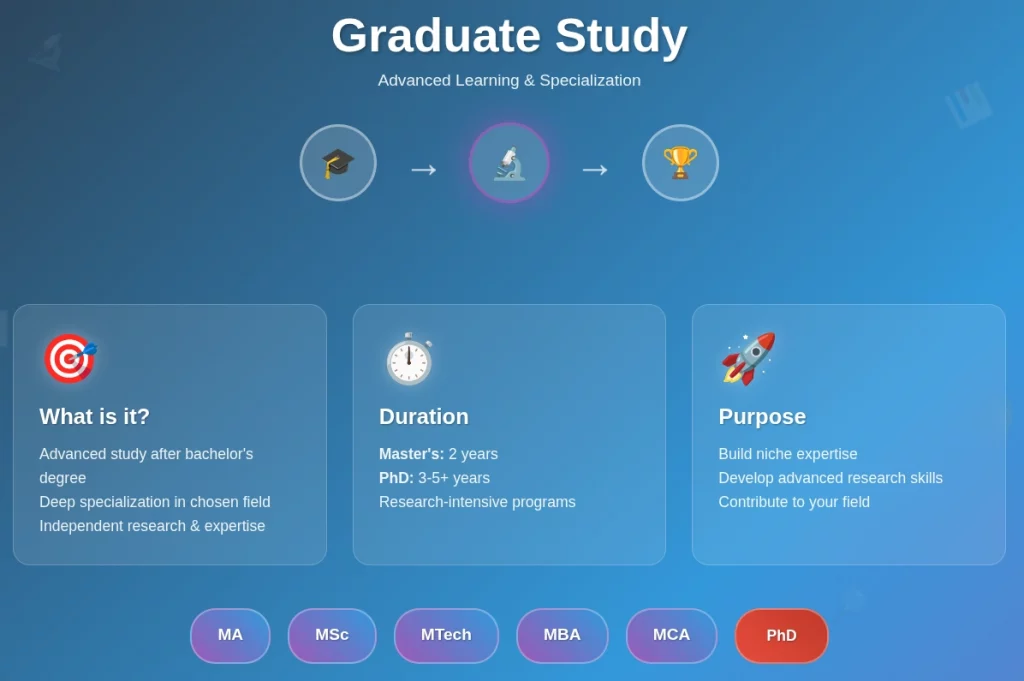Undergraduate and graduate studies mark distinct stages in higher education. Each offers a unique learning experience. This guide explains the key differences between these two academic paths. It helps you understand which one fits your goals.
1. Undergraduate Study
Undergraduate study is the first step into higher education after Class 12. It’s all about broad learning and foundational knowledge. You get to explore many subjects before specialising.

Definitions
- Undergraduate Course: This is what you pursue after Class 12. It leads to a degree. Examples are BA, BSc, BCom, BE, BTech etc.
- Duration: Undergraduate degrees in India are 3-4 years long. Engineering and professional courses like medicine take longer.
- Purpose: The main aim is to give you a broad understanding of a subject. You develop critical thinking and basic skills. You also get to explore many disciplines to find your interests.
Learning Method
Undergraduate study is structured learning. Professors teach. You do assignments and exams. The curriculum is set and guides you through core concepts. You learn to analyse information and solve problems using established methods.
Example: In a BA Economics course, you learn core economic theories. You study microeconomics and macroeconomics. You also explore related subjects like statistics or history.
Class Size and Interaction
Undergraduate classes have larger sizes. This means limited one-on-one interaction with professors. You participate in group discussions and work on projects with peers.
Assessment
Your progress is based on exams, assignments and quizzes. These assessments check your understanding of the course material. They ensure you get the basics right.
Goal
The goal of undergraduate study is to prepare you for entry level jobs or further education. It gives you a strong academic base.
Download the PDF on the Undergraduate Degree
2. Graduate Study
Graduate study comes after your undergraduate degree. It’s about specialization, advanced knowledge and independent research. You go deeper into a specific area of interest.

Definitions
- Graduate Course: This is a course you pursue after a bachelor’s degree. It leads to a master’s degree or a doctorate (PhD). Examples include Master of Arts (MA), Master of Science (MSc), Master of Technology (MTech), Master of Business Administration (MBA), or Doctor of Philosophy (PhD).
- Duration: Master’s degrees in India usually take 2 years. PhD programs take 3 to 5 years or more, depending on research.
- Purpose: The main objective is to build expertise in a niche area. You develop advanced research skills. You contribute to your field.
Learning
Graduate study involves self learning and research. You attend seminars, advanced coursework and intensive projects. You design and conduct your own research. You solve complex problems.
Example: In an M.A. Economics program, you specialize in econometrics or development economics. You do original research for a thesis.
Class Size and Interaction
Graduate classes have smaller sizes. This allows for more interaction with professors. You get personalized guidance and mentorship. This helps your research and academic growth.
Assessment
You are assessed on research papers, thesis or dissertation work, presentations and comprehensive exams. These assessments measure your ability to do original research and contribute to your field.
Goal
The goal of graduate study is to prepare you for specialized roles, research positions or academia. It makes you an expert in a specific domain.
Download the PDF on the Graduate Degree
Key Differences: A Comparison
| Feature | Undergraduate Study | Graduate Study |
|---|---|---|
| Prerequisite | Class 12 completion | Bachelor's degree |
| Focus | Broad knowledge, foundational learning | Specialized knowledge, research, deep expertise |
| Learning Style | Structured, guided lectures | Independent research, seminars, self-driven learning |
| Curriculum | Wide range of subjects, core courses | Niche topics, advanced coursework, thesis/dissertation |
| Class Size | Larger | Smaller |
| Professor Role | Lecturer, guide | Mentor, collaborator, research supervisor |
| Assessment | Exams, assignments, quizzes | Research papers, thesis, presentations, comprehensive exams |
| Goal | Entry-level jobs, general knowledge, preparation for graduate study | Specialized careers, research, academia, expert roles |
| Contribution | Absorbing existing knowledge | Creating new knowledge, contributing to the field |
Who Should Pursue Which?
When to Choose Undergraduate Study
- You recently finished Class 12.
- You want a broad education and foundational knowledge.
- You are exploring career paths or academic interests.
- You seek general skills for diverse entry-level jobs.
When to Choose Graduate Study
- You hold a bachelor's degree.
- You want to specialize in a specific field.
- You plan a career in research, academia, or highly specialized roles.
- You aim to gain advanced skills or a competitive edge in the job market.
- You want to contribute new knowledge to your chosen discipline.
Conclusion
In conclusion, undergraduate studies provide a broad foundation, while graduate studies offer specialization and advanced expertise, helping you choose the right path for your career goals.
A degree is important, but it won’t guarantee a job on its own. Employers value skills more. To build job-ready skills, take our free courses and boost your career prospects. Start learning today.
Also Read:
- Best Career Options after 12th Arts
- Best Career Options after 12th Commerce
- Best Career Options after 12th Science
FAQs about Undergraduate and Graduate Study
Q1: Does a master’s degree guarantee a higher salary?
A1: No, a master’s degree doesn’t guarantee a higher salary. It gives better job prospects in specialized fields and higher earning potential. Your skills, experience and industry demand also matters.
Q2: Can I directly pursue PhD after a bachelor’s degree in India?
A2: In India you cannot directly pursue PhD after a bachelor’s degree. You need a master’s degree first. Some integrated programs (BTech + MTech, or BSc + MSc) allows a smoother transition to PhD study.
Q3: Is undergraduate study only about theory?
A3: Undergraduate study includes theory. It also includes practical applications through labs, projects and internships. Many programs balance theoretical knowledge with hands-on experience.
Q4: How do admissions differ for undergraduate and graduate programs?
A4: Undergraduate admissions are based on Class 12 marks, entrance exams (like JEE, NEET, CUET) and sometimes interviews. Graduate admissions consider your undergraduate academic record, entrance exams (like GATE, CAT, GRE, GMAT), research proposals (for PhD) and recommendation letters.
Q5: Is one type of study “better” than the other?
A5: One type of study is not “better” than the other. They serve different purposes. Undergraduate study builds a foundation. Graduate study adds specialization. Your career goals and interests decides the best path for you.






